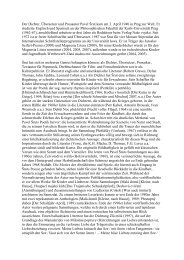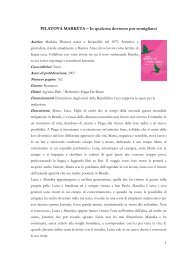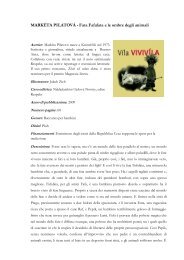SnÄ›nà pro lepÅ¡Ã Äas Dreams for Better Times - Portál Äeské literatury
SnÄ›nà pro lepÅ¡Ã Äas Dreams for Better Times - Portál Äeské literatury
SnÄ›nà pro lepÅ¡Ã Äas Dreams for Better Times - Portál Äeské literatury
Create successful ePaper yourself
Turn your PDF publications into a flip-book with our unique Google optimized e-Paper software.
Na smutný život v dětském domově si nalezenec Cilka<br />
ordinuje jablíčka a horu vlídnosti. Z ilustrací Denisy<br />
Wagnerové ke knížce Středa nám chutná.<br />
Once a found baby, Cilka uses apples and a generous<br />
helping of kindness to counter the loneliness of a life in<br />
achildren’s home. From Denisa Wagnerová’s illustrations<br />
in Procházková’s book The Fine Taste of<br />
Wednesday. Re<strong>pro</strong>: archiv/archive<br />
na popud Kristiána<br />
Sudy začala věnovat<br />
méně okupované<br />
a „normalizované“<br />
literatuře <strong>pro</strong><br />
děti, v níž debutovala<br />
textem Komu<br />
chybí kolečko (1980).<br />
Ohlasy na něj však<br />
vesměs motivovala<br />
paranoidní politika,<br />
hledající za<br />
vším alegorie, a tak<br />
o dalších počinech<br />
nemohlo být nadlouho<br />
řeči. O tři<br />
roky později byl už<br />
autorčin statut natolik<br />
neúnosný, že<br />
se s manželem –<br />
hercem a režisérem<br />
Ivanem Pokorným<br />
– rozhodla emigrovat<br />
do Rakouska,<br />
kde zažádali o poli-<br />
tický azyl. Po dvou letech odcestovali do Německa, nejprve<br />
do Kostnice a pak do Brém. „Měla jsem ohromné štěstí,<br />
<strong>pro</strong>tože osud to se mnou myslel dobře,“ vzpomíná.<br />
„Přihrál mi do cesty pana Gelberga, renomovaného nakladatele,<br />
který znal otcovy knihy a scénáře a už jako recenzentovi<br />
se mu ho podařilo v Německu <strong>pro</strong>sadit. A najednou<br />
zjistil, že píše i jeho dcera. Tehdy jsem už měla hotový<br />
Červenec má oslí uši, on si ho odvezl a nechal zlektorovat.“<br />
34<br />
by the echoes of the Stalinist era still raging in the streets,<br />
the childhood of the Olomouc-born writer, spent under<br />
the tower of the International Hotel in the Prague quarter<br />
of Dejvice, can no doubt be called exceptionally harmonic.<br />
Soon afterwards, however, the communist regime, offended<br />
by her father’s involvement with the intellectual elite<br />
of the memorable Prague Spring of 1968, decided to show<br />
the middle daughter of the novelist and playwright Jan<br />
Procházka how far its lust <strong>for</strong> vengeance can go. Being barred<br />
from university education, the only experience made<br />
available to her was that of a cleaner. As a result,<br />
Procházková’s first attempts at drama were sporadic, and<br />
the author took the advice of Kristián Suda to focus on the<br />
less occupied and “normalised” literature <strong>for</strong> children, in<br />
which she debuted with the text Who’s Got aLoose Screw?<br />
(1980). However, the reactions to the novel were to a large<br />
extent motivated by politically paranoid search <strong>for</strong> seemingly<br />
omnipresent allegories, her writing career being<br />
stifled <strong>for</strong> many years to come. Three years later her situation<br />
became unsustainable, and she and her husband – actor<br />
and director Ivan Pokorný – decided to emigrate to Austria<br />
and apply <strong>for</strong> asylum. After another two years they moved<br />
to Germany, first to Constance and later Bremen. “I was incredibly<br />
lucky. Fate had looked kindly upon me,” she recalls,<br />
“and crossed my path with that of Mr Gelberg, a renowned<br />
publisher, who knew my father’s books and<br />
scripts, and managed to press him through in Germany<br />
when just a reviewer. And suddenly he discovered, that his<br />
daughter is a writer too. Back then I had already finished<br />
Dog-eared July, and he took it and had it read.”<br />
The start of Procházková’s German career was, in many<br />
respects, singular: her „therapeutic“ childhood reminiscences<br />
from Prague’s Lesser Quarter below the Castle






